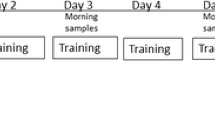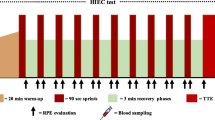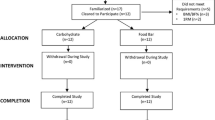Summary
Fifteen male endurance athletes were studied to determine the effect of a glucose polymer (GP) diet supplement on physiological and perceptual responses to successive swimming, cycling and running exercise. Thirty min of swimming, cycling and running at 70% \(\dot V_{{\text{O}}_{{\text{2}} {\text{max}}} } \), followed by a run to exhaustion at 90% \(\dot V_{{\text{O}}_{{\text{2}} {\text{max}}} } \) was performed after one week of training under two dietary conditions: 1) GP (230 g of GP consumed daily) and 2) placebo (P, saccharin-sweetened supplement consumed daily). During GP, daily carbohydrate (CHO) intake was higher (p<0.05) by 173 g or 14% of energy intake than during P, but total energy intake was not significantly different. During 90 min of exercise, CHO utilization and blood glucose were significantly higher under GP than P by an average of 20.2% and 14.5%, respectively, but heart rate, ventilation, oxygen uptake, ratings of perceived exertion, and plasma lactate were not different. Run time to exhaustion at 90% \(\dot V_{{\text{O}}_{{\text{2}} {\text{max}}} } \) was significantly longer by 1.2 min (23%) under GP. The results suggest that a GP diet supplement may be of value during endurance exercise by increasing the availability of CHO.
Similar content being viewed by others
References
American College of Sports Medicine (1986) Guidelines for graded exercise testing and exercise prescription. Lea & Febiger, Philadelphia
Bergstrom J, Hermansen L, Hultman E, Saltin B (1967) Diet, muscle glycogen and physical performance. Acta Physiol Scand 71:140–150
Blom P, Vaage O, Kardel D, Hermansen L (1980) Effect of increasing glucose loads on the rate of muscle glycogen resynthesis after prolonged exercise (Abstr). Acta Physiol Scand 108:C11
Borg G (1973) Perceived exertion: A note on “history” and methods. Med Sci Sports Exerc 5:90–93
Christensen EH, Hansen O (1939) Arbeitsfähigkeit und Ernährung. Scand Arch Physiol 81:160–171
Costill DL, Bowers R, Branaham G, Sparks K (1971) Muscle glycogen utilization during prolonged exercise on successive days. J Appl Physiol 31:834–838
Costill DL, Miller JM (1980) Nutrition for endurance sport: Carbohydrate and fluid balance. Int J Sports Med 1:2–14
Costill DL, Sherman WM, Fink WJ, Maresh C, Witten M, Miller JM (1981) The role of dietary carbohydrate in muscle glycogen resynthesis after strenuous running. Am J Clin Nutr 34:1831–1836
Coyle EF, Coggan AR, Hemmert MK, Lowe RC, Waters TJ (1985) Substrate usage during prolonged exercise following a pre-exercise meal. J Appl Physiol 59:429–433
Coyle EF, Coggan AR, Hemmert MK, Ivy JL (1986) Muscle glycogen utilization during prolonged strenuous exercise when fed carbohydrate. J Appl Physiol 61:165–172
Coyle EF, Hagberg JM, Hurley BF, Martin WH, Ehsani AA, Holloszy JO (1983) Carbohydrate feeding during prolonged strenuous exercise can delay fatigue. J Appl Physiol 55:230–235
Dennison D (1982) The Dine System. Mosby Press, New York
Ellsworth NM, Hewitt BF, Haskell WL (1985) Nutrient intake of elite male and female nordic skiers. Phys Sportsmed 13:78–92
Felig P, Cherif A, Minagawa A, Wahren J (1982) Hypoglycemia during prolonged exercise in normal men. N Engl J Med 306:895–900
Fielding RA, Costill DL, Fink WJ, King DS, Hargreaves M, Kovaleski JE (1985) Effect of carbohydrate feeding frequencies and dosage on muscle glycogen use during exercise. Med Sci Sports Exerc 17:472–476
Foster C, Meyer L, Hare J (1984) Practical demonstration of nutritional support in elite athletes. In: Kroll W (ed) Abstracts of Research Papers 1984 AAHPERD Convention, American Allicance for Health, Physical Education, Recreation, and Dance, Reston VA, p 117
Goldman RF, Buskirk ER (1961) Body volume measurement by underwater weighing: description of a method. In: Brozek J (ed) Techniques for measuring body composition. National Academy of Sciences, Washington, DC, pp 78–89
Gontzea I, Sutzescu R, Dumitrache S (1975) The influence of adaptation to physical effort on nitrogen balance in man. Nutr Rep Int 11:231–236
Green H, Houston M, Thomson R, Reid P (1979) Alterations in ventilation and gas exchange during exercise-induced carbohydrate depletion. Can J Physiol Pharmacol 52:1598–1607
Hargreaves M, Costill DL, Coggan AR, Fink WJ, Nishibata I (1984) Effect of carbohydrate feedings on muscle glycogen utilization and exercise performance. Med Sci Sports Exerc 16:219–222
Holly RG, Barnard RJ, Rosenthal M, Applegate E, Pritikin N (1986) Triathlete characterization and response to prolonged strenuous competition. Med Sci Sports Exerc 18:123–127
Hultman E, Nilsson LH (1971) Liver glycogen in man: Effect of different diets and muscular exercise. In: Pernow B, Saltin B (eds) Muscle metabolism during exercise II. Plenum Press, New York, pp 143–152
Ivy IL, Costill DL, Fink WJ (1979) Influence of caffeine and carbohydrate feedings on endurance performance. Med Sci Sports Exerc 11:6–11
Ivy JL, Miller W, Dover V (1983) Endurance improved by ingestion of a glucose polymer supplement. Med Sci Sports Exerc 15:466–471
Johnson A, Collins P, Higgins I (1985) Psychological, nutritional, and physical status of Olympic road cyclists. Br J Sports Med 19:11–14
Kelman GR, Maughan RJ, Williams C (1975) The effect of dietary modifications on blood lactate during exercise. J Physiol 25:34–35
Keppel G (1979) Design and analysis a researcher's handbook. 2nd ed. Prentice-Hall, Englewood-Cliffs, pp 209–221
Kohrt WM, Morgan DW, Bates B, Skinner JS (1987) Physiological responses of triathletes to maximal swimming, cycling, and running. Med Sci Sports Exerc 19:51–55
Langenfeld ME (1983) Glucose polymer ingestion during ultraendurance bicycling. Res Q Exerc Sport 54:411–414
Maughan RJ, Poole DC (1981) The effects of a glycogen-loading regimen on the capacity to perform anaerobic exercise. Eur J Appl Physiol 46:211–219
O'Toole ML, Hiller DB, Crosby LO, Douglas PS (1987) The ultraendurance triathlete: a physiological profile. Med Sci Sports Exerc 19:45–50
Rennie MJ, Johnson RH (1974) Effects of a exercise-diet program on metabolic changes with exercise in runners. J Appl Physiol 37:821–825
Siri WE (1961) Body composition from fluid spaces and density. In: Brozek J (ed) Techniques for measuring body composition. National Academy of Sciences, Washington, DC, pp 78–79
Stamford BA, Rowland R, Moffat RJ (1978) Effects of severe prior exercise on assessment of maximal oxygen uptake. J Appl Physiol 44:559–563
van Handel PJ, Cells KA, Bradley PW, Troup JP (1984) Nutritional status of elite swimmers. J Swim Res 1:27–31
Wilmore JH, Costill DL (1974) Semiautomated systems approach to the assessment of oxygen uptake during exercise. J Appl Physiol 36:618–620
Author information
Authors and Affiliations
Rights and permissions
About this article
Cite this article
Millard-Stafford, M.L., Cureton, K.J. & Ray, C.A. Effect of glucose polymer diet supplement on responses to prolonged successive swimming, cycling and running. Europ. J. Appl. Physiol. 58, 327–333 (1988). https://doi.org/10.1007/BF00417271
Accepted:
Issue Date:
DOI: https://doi.org/10.1007/BF00417271




